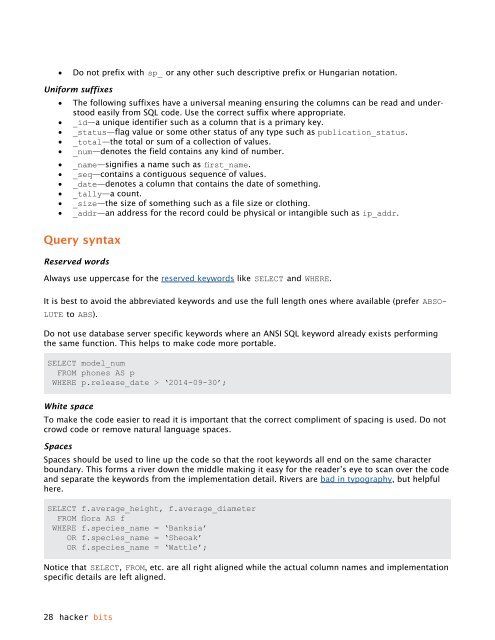Hacker Bits, Issue 11
HACKER BITS is the monthly magazine that gives you the hottest technology stories crowdsourced by the readers of Hacker News. We select from the top voted stories and publish them in an easy-to-read magazine format. Get HACKER BITS delivered to your inbox every month! For more, visit https://hackerbits.com/issue11.
HACKER BITS is the monthly magazine that gives you the hottest technology stories crowdsourced by the readers of Hacker News. We select from the top voted stories and publish them in an easy-to-read magazine format.
Get HACKER BITS delivered to your inbox every month! For more, visit https://hackerbits.com/issue11.
You also want an ePaper? Increase the reach of your titles
YUMPU automatically turns print PDFs into web optimized ePapers that Google loves.
• Do not prefix with sp_ or any other such descriptive prefix or Hungarian notation.<br />
Uniform suffixes<br />
• The following suffixes have a universal meaning ensuring the columns can be read and understood<br />
easily from SQL code. Use the correct suffix where appropriate.<br />
• _id—a unique identifier such as a column that is a primary key.<br />
• _status—flag value or some other status of any type such as publication_status.<br />
• _total—the total or sum of a collection of values.<br />
• _num—denotes the field contains any kind of number.<br />
• _name—signifies a name such as first_name.<br />
• _seq—contains a contiguous sequence of values.<br />
• _date—denotes a column that contains the date of something.<br />
• _tally—a count.<br />
• _size—the size of something such as a file size or clothing.<br />
• _addr—an address for the record could be physical or intangible such as ip_addr.<br />
Query syntax<br />
Reserved words<br />
Always use uppercase for the reserved keywords like SELECT and WHERE.<br />
It is best to avoid the abbreviated keywords and use the full length ones where available (prefer ABSO-<br />
LUTE to ABS).<br />
Do not use database server specific keywords where an ANSI SQL keyword already exists performing<br />
the same function. This helps to make code more portable.<br />
SELECT model_num<br />
FROM phones AS p<br />
WHERE p.release_date > ‘2014-09-30’;<br />
White space<br />
To make the code easier to read it is important that the correct compliment of spacing is used. Do not<br />
crowd code or remove natural language spaces.<br />
Spaces<br />
Spaces should be used to line up the code so that the root keywords all end on the same character<br />
boundary. This forms a river down the middle making it easy for the reader’s eye to scan over the code<br />
and separate the keywords from the implementation detail. Rivers are bad in typography, but helpful<br />
here.<br />
SELECT f.average_height, f.average_diameter<br />
FROM flora AS f<br />
WHERE f.species_name = ‘Banksia’<br />
OR f.species_name = ‘Sheoak’<br />
OR f.species_name = ‘Wattle’;<br />
Notice that SELECT, FROM, etc. are all right aligned while the actual column names and implementation<br />
specific details are left aligned.<br />
28 hacker bits















